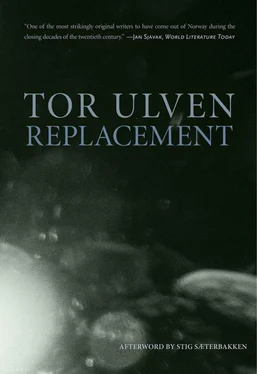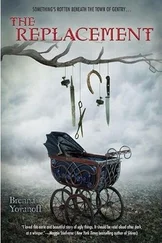You used to play with a drummer who pounded his sticks to splintery stumps, who banged away until slivers of wood were flying through the air after his maniacal rimshots, and you used to imagine him still drumming away when all he had left were a pair of flimsy stubs, no, a pair of broken toothpicks, and when he had nothing left he’d use his hands, he’d drum the flesh right off his hands, blow after blow, he’d drum them down to the bone, until all the bones in his hands were shattered, and after that he’d use his arms, then his legs, and, finally his head, he’d bang his skull against the snare drum, and it was only when his cranium was pounded to dust that the music would finally stop, or perhaps it would continue in the hereafter. What was it you read in the weekly paper? Oh yeah, that article about the guy who used a short-wave radio to listen to the dead, he even managed to record them, because the dead sent him special messages, messages he archived on meter after meter of tape, they’d prattle on about this and that, and, oddly enough, they spoke German, and even though the man didn’t understand a word of German, he knew what they meant when they said Wir sind die Toten , which the newspaper had translated. We are the dead.
You keep having to push the hair out of your eyes, it’s a constant irritation, in fact, it reminds you of a nagging woman. First comes the newspaper, carefully shredded (not the whole paper, mind you, especially not the pages printed on glossy paper, since they’d only choke the flame), then the kindling, then the larger pieces of wood (mahogany, pine), then the sailor suit, cap and all, then her bikini, because if they like it hot, they might as well burn, you think, burn on the bonfire. The pictures go on top of the clothes, good riddance, you think, to weigh everything down. You push your hair out of your eyes and look out (through your sunglasses) at the sea. They’re sailing (or puttputting, thumping, speeding, whining, etc.) past the bend, a whole drove of them, an armada, going in circles till evening, as though putting on a show, and you think that that’s exactly what they’re doing, they’re pretending to take it easy, pretending to enjoy the holiday, when in reality all they want to do is drink and puke and party till they drop.
The bottles in the woods. You’ll never forget them. Unbelievably, someone had dumped a bunch of empty liquor bottles beneath an overhang at the edge of the woods, there must’ve been dozens of them, scores, you remember feeling like you’d struck it rich, that you’d hit the jackpot and then some; you looked around to make sure you had them all to yourself, and sure enough you did; afterward, you moved every single bottle a suitable distance off the mountain path and then, after a short pause, during which you took in the true scope of your treasure, you began to break them, one by one, you didn’t hold back, no, you went to town, fast and furious, you were littering and it felt great. Every bottle that broke against the rock wall sent cascades of shards, like droplets of water, spraying in all directions, a sparkling shower that fell to cover the grass and moss growing on the forest floor (it reminded you of fountains down in the city, where you regularly went wading for change), you threw a bottle, it broke, you threw a bottle, it broke, until the last bottle had been shattered, and you sunk down on the grass to rest, exhausted by your day’s exciting work.
Driftwood, empty boxes, old fishing traps, leftover building supplies, and the like, or so it seems. The men are casting long shadows across the beach as they empty out the back of their pickup truck, occasionally hauling out some old furniture, which they carry two by two, while three or four eager boys scamper back and forth carrying lighter loads, though sometimes they choose things that are a little too heavy (tree stumps with clumps of roots still attached, an old outhouse door), which they have to drag behind them, leaving dark trails in the sand. The bonfire, pyramid-shaped, will be massive; one of the boys is climbing up the side of the pile, he’s got something in his hand, you can hear an adult voice calling to him, scolding him, he hesitates, looks up, raises the arm holding the object (a cardboard box?) above his head and tosses whatever it is up to the top, where it stays put, and now you can hear the boy’s excited, shrill yelp, and then the adult voice repeating itself, louder now, and the boy hastily scrambles back down.
It’s your duty to empty out the house, though the simple fact is that some items (like stereo equipment, cooking utensils, the fridge, the TV, to name just a few) won’t burn well, or won’t burn at all, and no one, you think, can expect the impossible. But you’ll make sure most of the flammable stuff burns, because the house is chockfull of superfluous things, you think, things that’ll eventually fall to pieces or be tossed out or be burned up in any case; it’s strange to think that everything that’s here will some day be gone, it’s only a question of time, after all, and therefore all you’re doing is getting a jump on time, lending it a helping hand, and when you get right down to it, you’re absolutely blameless, because everything in the house, you reason, will eventually disappear on its own, not partially, not selectively, but completely and all inclusively disappear, and in the grand scheme of things, the exact moment doesn’t matter, it doesn’t matter, that is, if it happens today or a thousand years from today. It’s happening today. In the grand scheme of things, everything you’ve tossed onto the fire (so you reason) has already been thrown out, and therefore it’s already garbage, it’s nothing but garbage. Once your thoughts reach this point, they go from being private and inaudible (and therefore inreferable) to being public and audible, and so you declare in a loud voice, which borders upon a shout, Down with junk! Down with junk!
The men stop their work on the bonfire, their Babylonian blaze, their tottering, tower-high edifice destined for destruction, which will be burned up in a matter of hours, and stare in your direction; you sneer (maybe they see it, maybe they don’t) and take a drink, and say in a low, uninflected voice, You high and mighty fucks sticking your noses where they don’t belong I’ll slice off your dicks and bury them together with your yachts and summerhouses so you can rot in hell. They don’t hear you. They just turn around and pick up where they left off. A white cloud draws back and reveals the sun. You undo your laces and kick off your tennis shoes. Since your fly is the button kind, not the zipper kind, you fumble at it for a moment, but at last you manage to get your jeans and your T-shirt and your socks and your underwear off. It’s like buying a used car, you’ve got to take it for a decent test drive, you think, and that’s what you said to her, It’s like buying a used car, you’ve got to take it for a decent test drive, and she’d gotten offended or hurt or (as you like to say) pissy; by this time you’ve tried it and she’s tried it again and again, in a variety of different sets, closets, backrooms, though always in new ones, belonging to plumbers and captains, steel guitarists and army colonels, foremen and lawyers, Punches and Judys, again and again, high-class places and low-class ones, poor ones and rich ones, you tried it out and tried it out, sometimes just briefly, sometimes for a little longer, but never for all that long. It bothers you that you can’t see your own back. At least the spots are fading, though, disappearing into a fresh layer of skin, going into hibernation, lying in wait until the next outbreak. Every so often they make an appearance, and when they do, sun and swimming help; even if your skin is somehow inferior, a worthless organ, right off the junk pile, that isn’t really the problem, you think, since they strike even the fair-skinned. It looks like the sun is having a positive effect and the booze is having a negative effect, so you’re 0 for 0, none the worse for wear, they cancel each other out. You laugh.
Читать дальше












